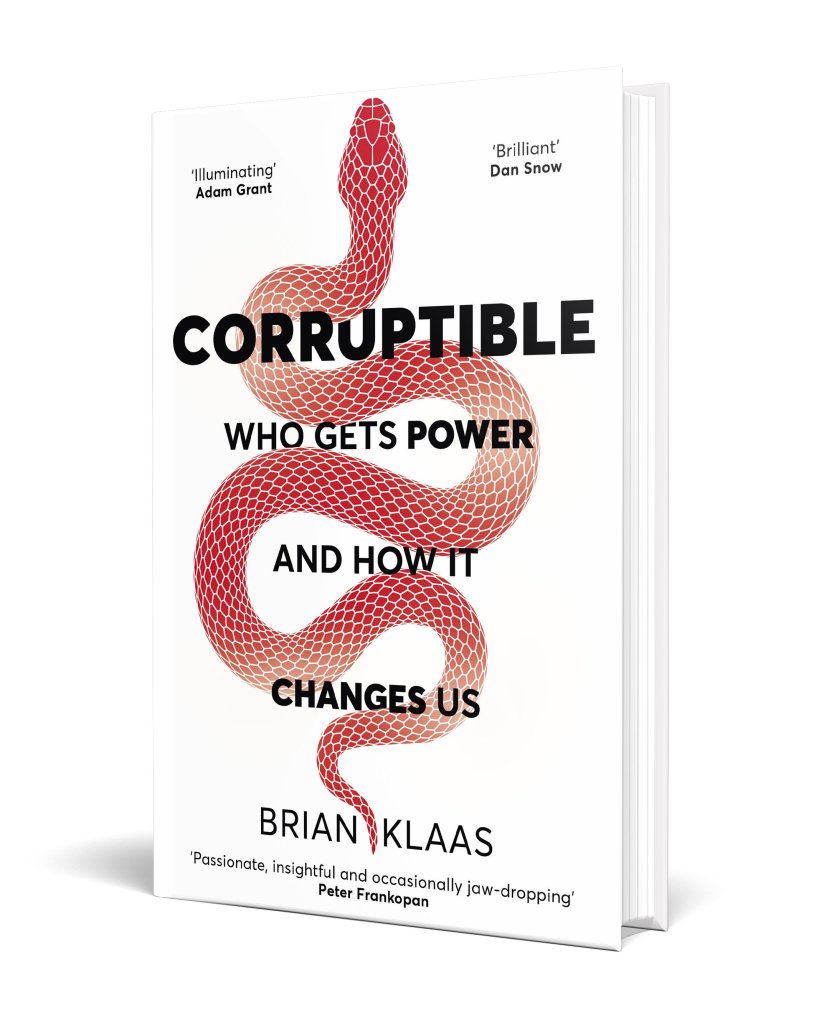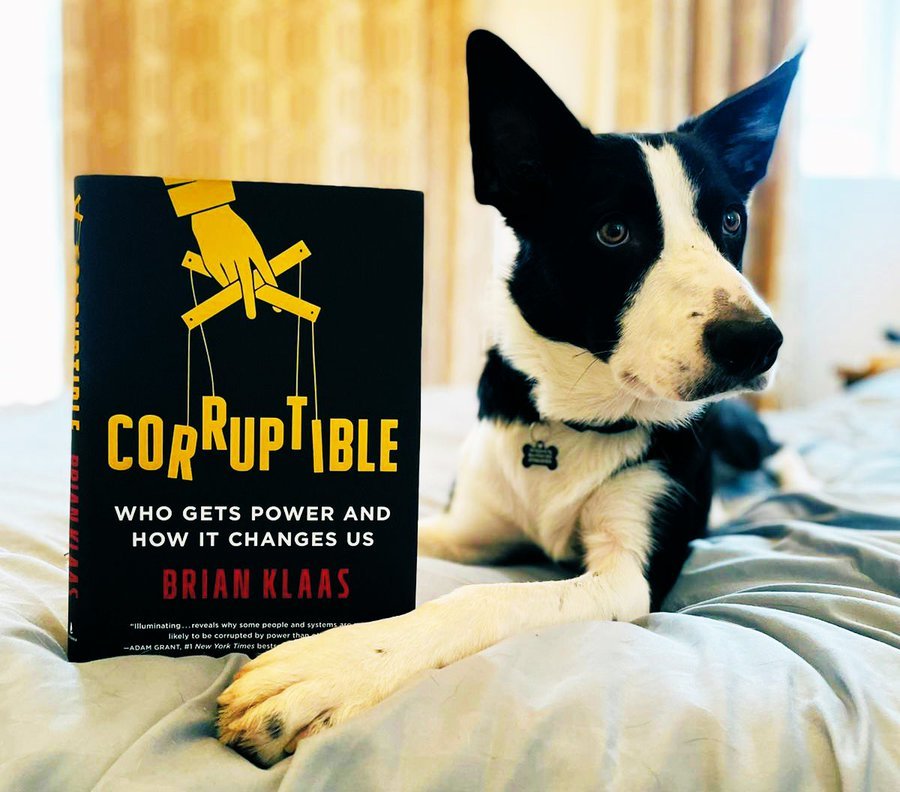
Corruptible: Who Gets Power and How it Changes Us
It is popular wisdom that those who seek and get power do not use it fairly and that the righteous shy away from disputes to obtain it. But how true is the lore and how much it affects our lives and choices is what the political scientist and expert in authoritarianism Brian Klaas aims to unravel in his latest book – Corruptible: Who Gets Power and How It Changes US.
The quest begins with a fabulous, intriguing comparison between two groups of shipwreck survivors, one established hierarchically and the other not.
“Two desert islands, two conflicting visions of human nature. In one, a single power-hungry individual consolidated control over others to exploit and kill them. In the other, egalitarian teamwork prevailed and cooperation reigned supreme. What accounts for the difference?” asks the author.

Power structure and hierarchy could be the answer, but where does our notion of rank and social dominance come from?
We may find some footprints in the missing link that connects humans with our common ape ancestor and in how we have drifted away from the sociobiology of modern monkeys.
“When it comes to our behavior, what separates us from monkeys and apes? It turns out, some surprising clues suggest we have an innate preoccupation with fairness and equality that chimps simply don’t.” Klaas explains.

Nonetheless, we cannot think major civilizations without a highly hierarchic organization.
“If the three-hundred-thousand-year history of our species, Homo sapiens, were condensed into a single year, we would mostly live in nonhierarchical, flat societies from New Year’s Day until approximately Christmas. In the final six days of the year, hierarchy would become the norm, as complex civilizations took root across the planet. Only then would dominance and despotism define us. Our modern societies are an outlier.”
Corruptible
Is hierarchy unavoidable and hierarchic organization a necessary evil to the progress of our species?
“Flat societies are deeply limiting for humans. Our choice is either to live in tiny cooperative groups or to embrace hierarchy. That’s why power and status are here to stay.”, says Klaas.
However, when we study contemporary power relations something makes us increasingly different either from chimpanzees, cavemen and tribal human societies – size, strength and physical aptitude are no longer central elements, but intelligence, combat strategy and the ability for persuasion.
By extension, our values were inverted – appearance over aptitude; shrewdness over strength; projection over natural leadership; corruption over fair achievement; aristocratic and military order over collective choice.

We cannot really say that we have evolved to become better pals and peers, on the contrary, some of us have lavishly developed cunning, enticing and seductive skills, and our intelligence has been moved by the best individual interests and the greatest clan benefits.
It is self-evident that in this game of “winners and losers” we have likely selected the greedy, the power-hungry, the unscrupulous, the corruptible, the reckless, the hypocrite, the callous, the unfeeling.

These players have the edge, mostly due to their pragmatism and, not infrequently, their lack of consideration for others, what also makes them prompt to welcome the results without pondering over the used means or methods.
And then comes another important question aroused in the book : are corruptible people drawn to power and better at getting it or power essentially corrupts those who wield it?
“Becoming powerful makes you more selfish, reduces empathy, increases hypocrisy, and makes you more likely to commit abuse. Lord Acton was right: power does tend to corrupt. The problem, then, isn’t that the conventional wisdom is wrong, but that the conventional wisdom only focuses on a tiny part of the picture.”
Corruptible

What is important to emphasize is that these features are far from being isolated, idiosyncratic personality traits; culturally, our society merits results, regardless the means. Our parents, our teachers, our bosses expect the delivery of good results from any newcomer and encourage the development of social skills that can make of him or her a successful offspring. That’s the essential bargain we inherited: deliver good results, project a succesful image and you will be loved.
How can we blame any person finely tuned and adapted to our society for being egocentric, individualist, narcissistic, and for living by the results? We all have the right of aiming to fulfill that lack of unconditional, genuine love with some bargain for power, success, control, and adoration, don’t we? It makes us feel loved, important, respected, even if momentarily, doesn’t it?

Corruptible brings many examples of how systems can be designed to favour or inhibit corrupt behaviour, from bee hives to parking fines. It is, indeed, a fascinating journey filled with real life stories, scientific studies, thought provoking interviews that will resonate with many situations you have observed or experienced with your family, from school, at work, in your city, in your country.
There are many insights and tips to : actively recruit and select better people to assume power positions, use randomness as a method to prevent corruption, rotate functions in order to avoid misconduct and reduce abuse of power. It also highlights the advantages of auditing the process of decision-making and not only the results, the fundamental importance of surveilling the ones in power, and advises us to entrust leaders and representatives with a pungent sense of responsibility, showing them the costs and consequences of their actions.
The whole book is the perfect marriage of instruction and entertainment. It can make you transcend that sense of psychological distance from social and political problems and want to engage in the feasible transformation of your environment and your fellow citizens’ lives.
Comte may excuse us, but individual lives must not be seen as abstractions.

These are for sure invaluable lessons that you will be delighted to explore, and urgent reflections that can render governance and leadership much more efficient, just and sustainable.
We must, however, consider that without education in human values, change is impracticable, because the old paradigms and the old mentality tend to prevail. It is tricky to classify people along the good/evil spectrum. Few are unshakeably good, few are unshakeably bad. The great majority gasps squeezed in between. The great majority are raised to deliver results- that’s what renders them corruptible. It is just about finding their unconfessed desires, their hidden weaknesses, their ambitioned price.
We need to love our children for the unique, creative, empathetic, loving being they naturally are and for the diverse, priceless, self-esteemed, confident, brave human beings they are willing to become, not for the results they deliver or the success they achieve. These are the attributes and the mindset of an incorruptible human being.
If your son, if your daughter, if your pupils, if your employees openly defy your rules, instead of obtusely fulfilling your expectations, try to comprehend and learn with them. They are your masters, and, paradoxically, their nonconformity makes them less susceptible to being corrupted by power. Your task is to observe and allow them to try and thrive out of your frame, out of your box.

Corruption is a smart way to succeed within systems designed to benefit few at the expense or through the exploitation of many.
Corruptible people take advantage of these systems’ rules to rise above the ones who submit or follow them blindly.
In tackling corruption we need to deconstruct exploitative systems, abolish abusive or incoherent rules and change egotistical mindsets; we need to stop bending people into the boxes of our many interests and conveniences.
References:
Klaas, Brian. Corruptible: Who Gets Power and How it Changes Us. John Murray Press. First edition, 2021.
About the author

Brian Klaas is an American political scientist, associate professor in global politics at University College London and a Washington Post columnist. His work is focused on democracy and authoritarianism. He is also the writer of The Despot’s Accomplice: How the West is Aiding and Abetting the Decline of Democracy (2016), The Despot’s Apprentice: Donald Trump’s Attack on Democracy (2017) and How to Rig an Election (2018). He is also the creator and host of Power Corrupts Podcast @PowrCorrupts, Bronze awarded as the “Smartest Podcast of 2020” by the British Podcast Award.
